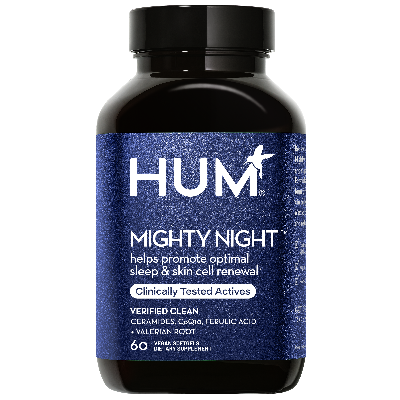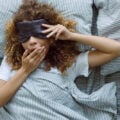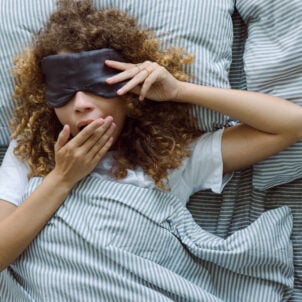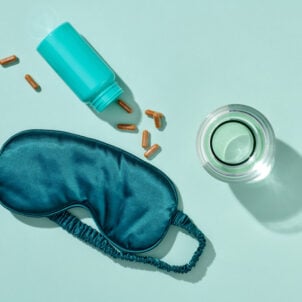Optimizing your sleep can lead to a world of wellness wins. Think: more daytime energy, enhanced immune function, pro-aging protection, and so on. As important as it is, getting high-quality shuteye (and more of it, at that) can be challenging.
If you’re on a quest to improve your ZZZ’s, one easy hack you may want to employ is the 3-2-1 rule for sleep. Keep reading to see what it is, how effective it may be, and what else you can do to improve your snooze nightly.
What Is the 3-2-1 Rule for Sleep?
The 3-2-1 sleep rule was coined by clinical psychologist Michael Breus, PhD, aka The Sleep Doctor (who, fun fact, supported HUM’s Mighty Night launch back in 2019).
According to the sleep expert, the 3-2-1 rule entails:
- Stopping alcohol consumption 3 hours before bed
- Not eating 2 hours before bed
- Not drinking fluids 1 hour before bed
Sticking to these time frames may help you:
- Avoid the ramifications of alcohol on sleep quality. Although some people may notice that alcohol helps them fall asleep, it actually inhibits quality rest, increases chances of snoring, and is linked to shorter sleep times.
- Allow you to digest food properly before bed. Many experts advise ceasing food intake (especially dinner) at least 2 to 3 hours before bed. That said, research shows mixed results on how much meal timing impacts different aspects of sleep. For instance, a 2020 study in International Journal of Environmental Research and Public Health found that eating within 3 hours of bedtime was associated with nocturnal awakening but didn’t have a significant impact on sleep onset latency (i.e., the time it takes to fall asleep) or lead to shorter sleep durations. Another 2021 study published in the British Journal of Nutrition also found that eating and drinking less than an hour before bedtime was linked to waking after sleep onset—but also to longer sleep durations, which may be triggered by a need to compensate for rest after waking.
- Prevent twilight trips to the bathroom to relieve your bladder. If you wake up several times throughout the night to use the bathroom, ceasing fluid intake leading up to bedtime can be a good idea. Research shows that nocturia (i.e., a condition marked by 3+ bathroom visits per night) is associated with long-term sleep deprivation, thus wreaking havoc on your immune health, general health status, and sense of well-being.
Is the 3-2-1 Sleep Rule Enough?
The 3-2-1 rule for sleep is simple enough to remember—and for many, to employ. “The pros of following this schedule are better sleep, better energy throughout the day, and the ability for your body to fully recover during sleep,” says Stephanie Crabtree, MS, RD, owner of Holistic Health RD near Sarasota, Florida.
However, it might not be suitable or effective for everyone, and may only be a starting point from which to optimize your sleep habits further.

“While these guidelines are a step in the right direction, I generally advise limiting alcohol consumption to special occasions—or avoiding it altogether,” says Kelly Murray, a certified pediatric and adult sleep consultant and owner of Kelly Murray Sleep Consulting. “Alcohol can disrupt blood sugar levels, cause dehydration, impair REM sleep, and trigger inflammation—all of which negatively affect sleep quality.” As such, abiding by the 3-hour rule won’t move the needle nearly as much as abstaining from hard drinks altogether.
Moreover, Murray says that some people—namely those prone to overnight blood sugar dips, which can lead to fragmented sleep—may actually benefit from eating a light snack closer to bedtime. If you’re in this camp, she recommends nibbling on 100 to 200-calorie snacks combining healthy fats, protein, and complex carbohydrates. (Think: apple slices with peanut butter, crudites, and hummus, or a berry protein smoothie.)
Crabtree adds that it may be difficult for some people to follow the 3-2-1 rule based on work schedules, medical conditions, and other lifestyle factors. In addition, you should allow for some flexibility based on what works for your own body and needs, and to not be too rigid or stressed over perceived slip-ups. “If someone is trying to follow the rules perfectly and gets anxiety over not being able to follow them, that could create more harm and sleep challenges,” she cautions.
In short, the 3-2-1 sleep rule is a simple framework that has the potential to enhance sleep hygiene for some, but it’s unlikely to be a one-size-fits-all solution.
Additional Sleep Tips for Better Rest
“Sleep is vital to every aspect of our body and needs to be prioritized for our overall health and vitality,” Crabtree reminds us. As such, if you find that you need to go above and beyond following the 3-2-1 rule, try out some of the pro-vetted sleep tips and tricks below.
Mind Your Daily Diet
It’s not just your dinner that can impact how much and how well you sleep. Be sure to prioritize healthy, whole, and balanced fare throughout the entire day.
“Consuming foods high in refined or starchy carbs can lead to blood sugar spikes and dips throughout the day,” Murray shares. “This pattern may repeat overnight leading to issues with falling or staying asleep.” Instead, she suggests balancing your plate with healthy fats, protein, and complex carbohydrates with every meal.
Watch Your Caffeine Intake
Many people rely on caffeine to perk up in the morning and afternoon, not realizing that the stimulant remains in the body for hours post-consumption. Some foods like chocolate also contain caffeine, which can hinder your ability to sleep soundly. As such, Crabtree suggests keeping tabs on the timing and portion of your caffeine intake, adjusting as needed based on your sensitivity to caffeine and the severity of your sleep issues.
Sip More Earlier in the Day
Crabtree recommends drinking the bulk of your fluids before noon, not only to limit nocturnal awakenings but also to keep tabs on hydration. “Your brain wakes up dehydrated because it can’t store water, and it is made of 75 percent water,” she shares. “If you are able to drink more water in the morning time, it’s less likely that you will need to get up in the middle of the night to go to the bathroom.”
Establish a Bedtime Routine
If you don’t have a nightly wind-down ritual, this is your cue to create one. The human body thrives on routine and consistency can help ease your way into sleepiness.
Murray advises carving in 2 hours of wind-down time before hitting the hay. “Working or engaging in stimulating activities too close to bedtime can overstimulate your mind and make it hard to get good quality sleep,” she shares. “Instead, focus on engaging in relaxing activities like reading a book, listening to a podcast, or doing some gentle stretching.” In case you like to relax by watching TV, Murray suggests turning it off 30 to 60 minutes before your sleep time.
Take the Pressure Off Achieving Perfect Rest
As much as we might all want to sleep soundly and awaken feeling refreshed, we might have periods in which this seems intangible. Yet instead of stressing out over it, give yourself grace and don’t get too dismayed.
“Don’t lose sleep over losing sleep,” Murray advises. “It is normal to have periods of poor quality sleep during stressful times. However, if you start to lose confidence in your body’s ability to sleep well, you will develop sleep anxiety, which will worsen or prolong your sleep issues.” If and when this happens, Murray suggests reframing nighttime as a time to relax, and not just sleep. “If you can focus on relaxing, sleep will follow.”
Consider Natural Supplements for Sleep
If your sleep quality could use a boost, consider checking out HUM’s Mighty Night. The non-drowsy formula features valerian root, passion flower, and hops—natural aids to encourage relaxation and promote sleep. Bonus: On top of supporting high-quality ZZZ’s, it also promotes skin cell turnover for a healthy complexion and even skin tone courtesy of ceramides, ferulic acid, and CoQ10.
3-2-1 Sleep Rule FAQs
Does the 3-2-1 sleep rule work for everyone?
According to Crabtree, the 3-2-1 rule is applicable to the general population. However, it might not be suitable for everyone.
“It could be hard for shift workers to follow this schedule, if their schedule changes from week to week, or if they work evening shifts,” she explains. Moreover, if you’re on certain medications, it may be challenging to avoid eating for longer time frames before bed—so you’ll want to heed the advice of your healthcare team.
“If you already have a sleep disorder, it’s best to contact your sleep specialist to see if this routine is appropriate for you,” the dietitian adds.
Can I drink water during the last hour before bed?
If you feel parched closer to bedtime, you don’t have to deny yourself some H2O. Simply remember to consume small sips rather than huge gulps. Yet if you wake up often in the middle of the night to use the restroom and this negatively impacts your sleep quality, consult a physician.
Should I try this rule if I don’t have trouble sleeping?
While the 3-2-1 rule may help support overall sleep hygiene alongside other interventions, it isn’t necessary for everyone.











